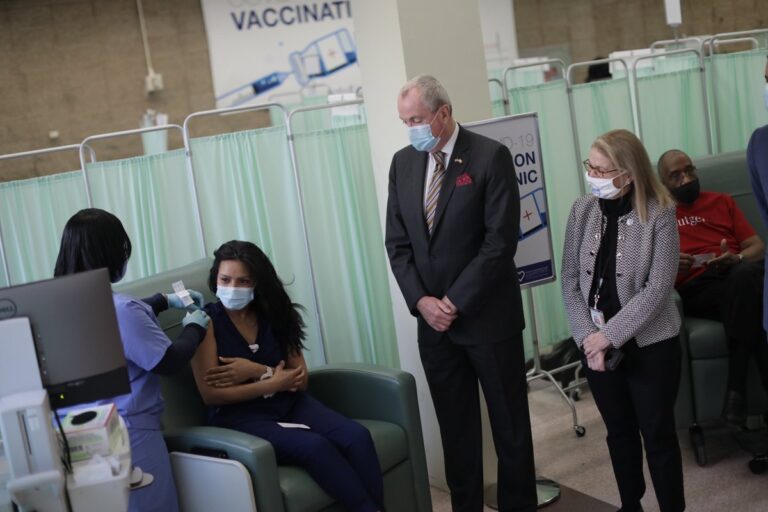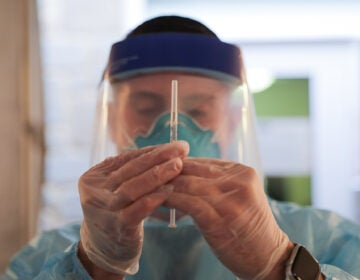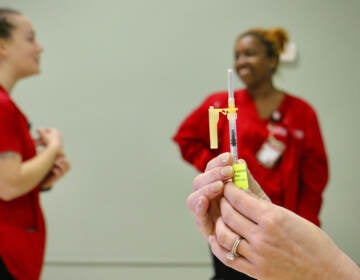Confidence delivered with second shot of COVID vaccine
Frontline health workers in N.J. receive their second shot of the Pfizer-BioNTech vaccine this week.

Gov. Murphy looks on as frontline health care workers at University Hospital in Newark received their second doses of the Pfizer-BioNTech vaccine. (Twitter/@GovMurphy)
Ask us about COVID-19: What questions do you have about the current surge?
The buzz among health care workers when the first boxes of Pfizer-BioNTech’s COVID-19 vaccine started arriving at South Jersey hospitals in December matched the excitement of those who saw the trucks leaving a Michigan warehouse with the doses.
“I wasn’t there when the boxes arrived, but I heard about it,” said Veronica Manlove, an emergency room nurse for Virtua Camden and Virtua Our Lady of Lourdes hospitals. She was the third person in line when inoculations began.
“When that first person got their shot,” she said, “everybody was cheering ‘cause we were just so happy.”
Manlove, like many health care workers, is due for her second shot this week.
New Jersey Gov. Phil Murphy and state Health Commissioner Judith Persichilli were in Newark Monday as Maritza Beniquez, a 56-year-old emergency room nurse at University Hospital, received her second dose of the Pfizer-BioNTech vaccine.
Out of about 15,000 employees across their system, Virtua has vaccinated more than 6,000 as of Jan. 4. Manlove is expected to receive her second dose on Friday.
The Pfizer-BioNTech and Moderna vaccines were approved a week apart in December for emergency use by federal regulators. NPR’s All Things Considered reported that a vaccine from New Brunswick-based Johnson & Johnson is likely the next candidate to seek approval. That vaccine has the advantage of being a single shot. Pfizer and Moderna’s vaccines are both composed of two shots administered three weeks apart.
Overall, the rollout in the Garden State has been slow, mirroring national trends. Gov. Phil Murphy said Monday that 101,417 vaccinations had been administered, just a fraction of the roughly 400,000 doses sent to the state by the federal government. NorthJersey.com previously reported that the state has blamed logistics, timing, and lack of personnel for the slow distribution of the vaccines.
Manlove, 55, said she has not experienced any major side effects with the first dose.
“They said you might get some mild ones on the second one, but I’m OK with that,” she said. “That just means it’s working and it’s building up what it needs to build up.”
Even after receiving the second dose of the vaccine, Manlove will still need to wear personal protective equipment at work — a face mask, gown, and gloves — while dealing with patients until transmission of the coronavirus has essentially flatlined.
Manlove said wearing PPE lessens anxiety and gives her a little more confidence especially when dealing with a really sick coronavirus patient.
“I’m doing what I can to help them without worrying that I’m going to bring something home to my family,” she said. “You can actually concentrate on your patients.”
Disclosure: WHYY has received funding from Virtua.

Get daily updates from WHYY News!
WHYY is your source for fact-based, in-depth journalism and information. As a nonprofit organization, we rely on financial support from readers like you. Please give today.





![CoronavirusPandemic_1024x512[1]](https://whyy.org/wp-content/uploads/2020/03/CoronavirusPandemic_1024x5121-300x150.jpg)

